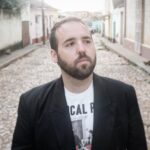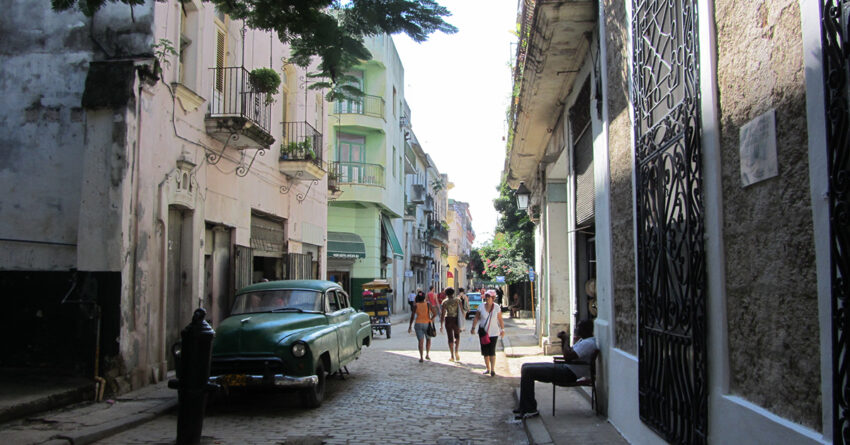Some good news for travel to Cuba came last Wednesday, June 8. About three weeks after the Biden announced that it was pulling back some of the Trump-era restrictions on travel to Cuba, the government has clarified what those policy changes will consist of. The good news is that People to People travel is back.
The details of the regulatory structure were released by the Office of Foreign Assets Control (OFAC), the part of the United States Treasury Department that regulates what money can be spent by Americans in Cuba under the terms of the United States embargo.
The May 16 press release from the Biden administration established that the United States would again allow some fights to airports other than Havana, and would reinstate educational travel, but did not yet reinstate the “People to People” program. Tour operators would have to watch for OFAC to release the memo to get specifics.
On June 8, before the announcement from OFAC, I spoke to Chaz Chambers, owner of Havana Music Tours, which provides small group trips to Cuba that provide in-depth explorations of Cuba’s rich music culture.

Chambers was pleased that the Department of Transportation removed the restriction against flying to any point in Cuba other than Havana. But the policy change did not, in itself, produce any new flights. Trump had promised to “cancel” Obama’s opening to Cuba, and he didn’t quite do that; but his tightened restrictions, followed by the COVID pandemic, pretty much killed the Cuba travel market for Americans. Cruise lines and airlines disappeared, and while some tour operators kept operating under the new regulatory regime, the public perception has been that Cuba is off limits again. And the market reflected that perception. The business that had taken off after Obama’s opening would have to be built again from the ground up.
“The DOT removed the [flight] restrictions from last administration,” he said. “They had previously limited charter flights, and they had only allowed flights to Havana, instead of other cities and provinces. But we haven’t seen any of those flights pop up yet. I’ve seen things about pilot shortages and so forth, so I don’t know. Even though they got rid of that regulation, I don’t know when or to what extent we are going to see extra flights to Cuba, or when the airlines will see that as profitable.”
We spoke on Wednesday, when Chambers was watching for the follow-up memo from OFAC, not knowing when it would be issued. It came out later that day. He explained what he was hoping for from the memo: the reinstatement of group People to People travel. It turned out he got that.
“Group people to people travel gives us a little more leeway as to where we can do tours, what we can do—the content of our itinerary,” he said.
Havana Music Tours kept operating in Cuba after most travel businesses pulled out. The curtailment of People to People travel didn’t stop it because it was operating under a different license.
“The Support for the Cuban People license is what we’ve always done,” he said, “from the beginning, even before the license changed.” Havana Music Tours had no trouble fulfilling requirements for the Support for the Cuban People because it’s a small, hands-on operation that works closely with the Cuban people. Some of the larger operators who had been essentially outsourcing their ground operations to local, government travel agencies, had to cease those operations.

Immersed in Cuba
Chambers is a drummer who became increasingly absorbed in Cuban music, and through his network of Cuban musicians and friends, met and married a Cuban musicologist. The couple both work to put together highly personal, immersive music tours of Cuba. The service falls easily under the “Support for the Cuban people” category that is allowed by the United States government.
“We do support local musicians and private businesses and private restaurants, private casas, and things like that,” he said. “So, when they changed the rules, it didn’t really affect us.” But revival of the People to People license would remove a lot of red tape.
“The People to People role would give us a little more leeway,” he said. “For example, if I wanted to go to La Zorra y el Cuervo, a jazz club that has really great jazz musicians playing, it’s hard to say I’m supporting the Cuban people if the money is going to a government jazz club. But People to People makes that a little more vague, because People to People means connecting with Cubans, and talking with Cubans, not necessarily giving them money or support.”
The company’s tour groups are small, five to 10 people, which makes them flexible and mobile. It’s a far cry from mass tourism.
“It’s a big difference between a big bus tour with 40 people versus a small group of five to 10 people, the things you can do with a small group,” he said. “You can kind of sneak into a cool underground music club, versus if I show up with a couple of buses of 80 people. It’s not the same experience.”
The United States government regulations, with the 12 licenses for travel to Cuba, seem like intricate and esoteric religious tracts; but they are part of what Americans have to do to travel under the Cuban embargo, which is still in place after half a century. Cuba is one of the few countries I know of where Americans are prohibited from traveling by their own government.
For the travel industry, the Biden administration’s move is a disappointment, not going as far as to restore the Obama-era opening. But it’s a step in that direction. For a small operator like Havana Music Tours, it’s an improvement; and for some larger operators, it will make it possible to offer tours again.
According to Chaz Chambers, it’s not the regulations themselves that keep Americans out of Cuba, it’s the confusion generated by the publicity.
“The main thing that happens with these rules is that there’s usually publicity about it when it happens, the news stories about it,” said Chambers. “CNN or other big publications will say it’s going to be easier to go to Cuba. Or they’re restaffing the embassy, so Americans feel more comfortable to go there. That’s mainly what it’s all about. This whole time people have been able to go to Cuba. There have been licenses to do it pretty simply. It’s just the red tape of it all. So, people think, ‘I don’t want to think about all that when I go on vacation. I want to just go to the Bahamas and sit on the beach, or whatever.’
“If you tell people, ‘Hey it’s not a big deal, come travel with us and we’ll take care of all that,’ then they’ll go. You just need to put some news out there that says, ‘Hey, you can go. Go to Cuba. Go check it out.’”
After being in a bubble under a United States embargo for more than half a century, Cuba has developed unlike any other country. It provides one of the most starkly different cultures Americans can experience anywhere in the world, and it’s only 90 miles from Florida.
Chambers believes Cuba’s music culture is the most advanced in the world, certainly one worth checking out, along with all the other aspects of Cuban culture.
“My wife and I really have a cool thing to be able to work together, go back and forth to Cuba, support our friends and family and also show Americans a different way of life,” he said. “I think people go to Cuba and it really blows their minds, they don’t know what to think. It’s a lot to unpack. A lot of people go to Cuba and get obsessed and keep going back. One of our former clients has been back more than seven times. He keeps going and recording. He’s just addicted to it.”
I understand that. I’ve been to Cuba four times, and I would return any time. With a high concentration on music in the public education system and much less noise from mass media, Cuba produces highly focused musicians and a rich musical culture. I heartily recommend it to all Americans.
 David Cogswell is a freelance writer working remotely, from wherever he is at the moment. Born at the dead center of the United States during the last century, he has been incessantly moving and exploring for decades. His articles have appeared in the Chicago Tribune, the Los Angeles Times, Fortune, Fox News, Luxury Travel magazine, Travel Weekly, Travel Market Report, Travel Agent Magazine, TravelPulse.com, Quirkycruise.com, and other publications. He is the author of four books and a contributor to several others. He was last seen somewhere in the Northeast U.S.
David Cogswell is a freelance writer working remotely, from wherever he is at the moment. Born at the dead center of the United States during the last century, he has been incessantly moving and exploring for decades. His articles have appeared in the Chicago Tribune, the Los Angeles Times, Fortune, Fox News, Luxury Travel magazine, Travel Weekly, Travel Market Report, Travel Agent Magazine, TravelPulse.com, Quirkycruise.com, and other publications. He is the author of four books and a contributor to several others. He was last seen somewhere in the Northeast U.S.



